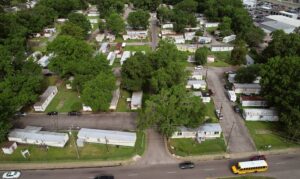
by Dick Hall-Sizemore
A recent article on this blog about the high cost of housing generated a considerable amount of discussion. Much of the discussion centered around the role of government in contributing to the affordable housing shortage.
I offer another reason: good old-fashioned capitalism.
A recent article in The Virginian Pilot well illustrates this point. A mobile park in Norfolk in which approximately 100 mobile homes are located has been sold to an Alexandria-based real estate company.
The real estate company paid $9.75 million for the 12-acre park. It did not shell out this money to own and operate a mobile home park. It plans to construct a 418-unit apartment and townhome complex with a pool, a clubhouse and a recreation area. The current tenants have until March 2023 to vacate. Some have lived there for more than fifty years.
Many, if not most, of the people who live in the park own the mobile homes in which they live. Mobile homes can be moved, but doing so is expensive. The real estate company has offered mobile home owners $2,500 each, the minimum required by a law passed by the 2020 General Assembly, to cover moving expenses. Even with an additional $2,500 offered by Catholic Charities of Eastern Virginia, that might not be enough. Furthermore, many of the mobile homes are too old to be moved. Even for those that could be moved, the availability of sites elsewhere is limited
The city council did play a role in the conversion of the mobile home park to a high-end residential complex. It unanimously approved the conditional use permit for the development. The Virginian Pilot article does not include any details about this action, but it could well be that the council had little discretion under Virginia law regarding the permit. Based on the minutes of the council, there was little discussion of the action. The planning commission had unanimously recommended approval upon the condition that the plans for the proposed project be reviewed by the city’s urban design consultant under the design review process.
One cannot blame the owner or owners of the mobile home park for taking the money and running. Almost $10 million can provide for a comfortable life style without the headaches of running a mobile home park. And one cannot blame the real estate company for opting to build high-end residential units over operating a mobile home park. After all, its function is to make a profit for its investors.
In many ways, there are many positive aspects to this story. The city of Norfolk gains about 300 housing units. The assessed value of the parcel will surely be more than its current assessment of $6.5 million, thereby increasing the property tax revenues for the city. The real estate company will make a profit for its investors, which should, at some point, increase the tax revenue for the Commonwealth.
All of that will be of little or no solace to the low-income residents who will lose their homes and be forced to search for other housing that they can afford.

Leave a Reply
You must be logged in to post a comment.